WDI’s flagship mini-MBA certificate program, delivered in partnership with Stockholm School of Economics in Riga, is now being offered in a flexible, hybrid format. It includes a blend of synchronous and asynchronous online and face-to-face instruction at SSE Riga. The Strategic Management Programme features six modules which equip participants with a cross-functional approach to business. The program offers access to world-class professors who will share global best practices in the areas of marketing, strategy, financial management, and leadership. It features lively discussions around global management trends and ample opportunity to explore the challenges that participants face every day in their businesses. The program is offered in the spring.
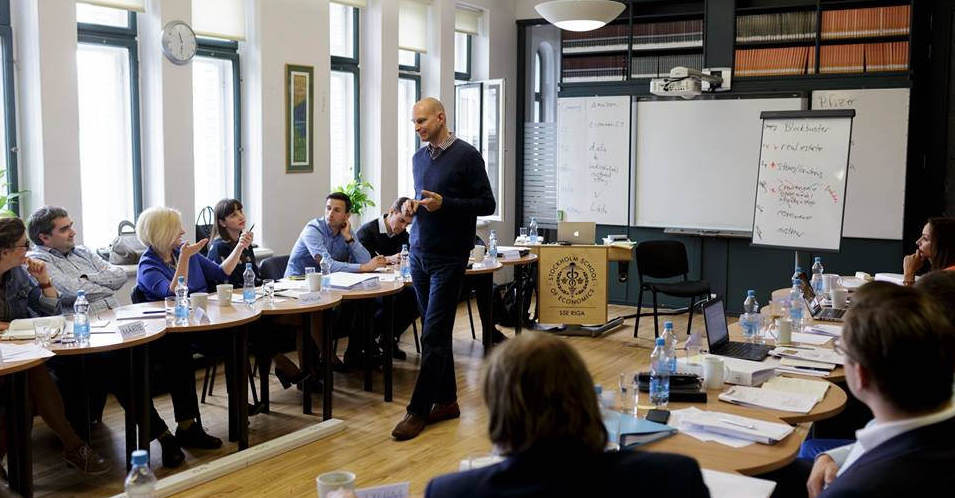 WDI’s executive education programs, delivered in partnership with the Stockholm School of Economics (SSE) in Riga, are attracting more international participants, bringing diverse opinions to the classroom and thereby adding value to the programs.
WDI’s executive education programs, delivered in partnership with the Stockholm School of Economics (SSE) in Riga, are attracting more international participants, bringing diverse opinions to the classroom and thereby adding value to the programs.
In past years, participants in the executive education offerings from WDI’s Education initiative at SSE Riga are citizens of host country Latvia and one or two neighboring Baltic countries. But for this year’s spring programs – the flagship, 10-day Strategic Management Program (SMP), Supply Chain and Logistics Management and Advanced Negotiations – drew participants not only from Latvia but also Russia, Chile, Estonia, Lithuania, Germany, Ukraine and even from as far away as Canada.
Santa Zeidaka, program manager at SSE Riga, said a key selling point is that its offerings are highly ranked in the Nordic and Baltic regions. She also said SSE Riga leverages its alumni network to spread the word on its programs and promotes them at conferences and on social media.
Zeidaka said a more international classroom benefits all the participants.
“Having an international group helps people open up more,” she said. “Participants get to see the problems from more diverse perspectives and this pushes participants to open their minds more, which is valuable when people work in international companies.”
For the popu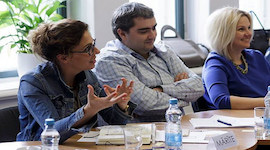 lar SMP – also known as a “mini MBA” – participants came from Latvia, Lithuania, Ukraine and Canada. The program, tailored for high potential, mid- to senior-level managers, features four modules – strategy, finance, marketing, and leadership – and is structured around an integrative strategic framework. The program, held in May, combines lectures, discussions, cases and exercises. Participants also conduct group work, which enhances their critical thinking, decision-making and teamwork skills.
lar SMP – also known as a “mini MBA” – participants came from Latvia, Lithuania, Ukraine and Canada. The program, tailored for high potential, mid- to senior-level managers, features four modules – strategy, finance, marketing, and leadership – and is structured around an integrative strategic framework. The program, held in May, combines lectures, discussions, cases and exercises. Participants also conduct group work, which enhances their critical thinking, decision-making and teamwork skills.
Amy Gillett, vice president of WDI’s Education Initiative, said the fact that the SMP drew participants from four countries speaks to its strong reputation. She said participants around the world are recognizing the great value of this program.
“The Strategic Management Program is greatly enriched by having such a global audience,” she said. “Since the program is highly interactive with participants sharing their experiences, these diverse viewpoints spark new ideas and connections. Next year, we expect to attract participants from even more countries.”
This article traces the development of management education in Central and Eastern Europe over the past 30 years and provide recommendations for the future of management education in this part of the world. The authors, Danica Purg and Alenka Braček Lalić of IEDC-Bled School of Management, identify emerging business issues in Central and Eastern Europe and the resulting opportunities for institutions in the region to respond to these challenges with appropriate management and leadership development.
This article is part of the 25 Years of Market-Based Solutions article series released in honor of the William Davidson Institute’s 25th anniversary. Since its founding in 1992, the Education Initiative at the William Davidson Institute has helped management education institutions around the world develop their capacity. We look forward to continuing this work — and sharing key learnings — over the coming decades.
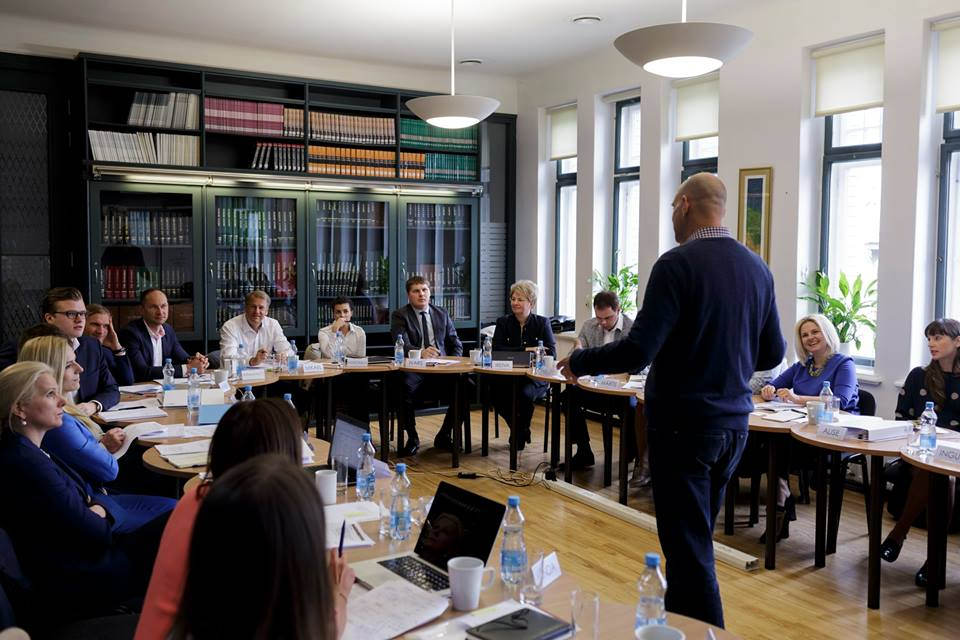
WDI Faculty Affiliate John Branch teaches a marketing module during the 2016 Strategic Management Program in Latvia.
Soon after Robert M. Teeter’s death in 2004, the WDI Board of Directors established a scholarship program in his honor to allow owners and managers of small- and medium-sized enterprises in emerging economies to attend the Institute’s professional education programs for free. Teeter was an advisor to several U.S. presidents and a former WDI board member.
Each year, 20 scholarships are handed out to worthy recipients. Recently, WDI’s Education Initiative spoke with four who attended WDI programs in 2016 to see how they and their organizations were impacted by the sessions. Three attended WDI’s 10-day Strategic Management Program (SMP), and one participated in an inaugural program on Strategic Thinking. Both programs were held at the Stockholm School of Economics in Riga, a longtime partner of WDI Education.
Read the full article and profiles of the four participants here.
Dovilė Pranckevičienė of Lithuania is the co-founder and director of a foreign language training school. “My knowledge was very narrow,” she said. Attending the SMP “was really an eye-opener for me, one who had no background in business management.” She said she “gained a lot of knowledge in a short period of time.”
Aleksandrs Lescinskis has his own law firm in Latvia and also manages a Judo studio and a sports association. He liked the SMP’s condensed timeframe and collaborative atmosphere.
“During a short period of time – two weeks, four modules – you can share your existing experience with professors and colleagues, looking at the same things from different angles, broadening your perspective,” he said. “We are working in different areas, but during this course we can find similar things to discuss, to share. I had to a chance to find out new things, to have new colleagues, new professors, to have communication. All things will help me in the future to go further.”
Santa Krastiņa of Latvia attended WDI’s first Strategic Thinking program. As a leader of an environmental NGO, Krastiņa said she immediately put to work what she learned. Krastiņa shared her training with her colleagues at her organization, and expects their new knowledge to positively impact how they work with partners and how they approach new markets.
“We have a lot to think through about our future – how we will fund ourselves, how we will survive,” she said.
Krastiņais is optimistic the training she received from WDI will help her organization accomplish great things.
“I got new knowledge to put into practice [with] my co-workers,” she said. “Together, we will find a solution.”
WDI Education begins 2017 looking forward to the 12th year of partnership with the Stockholm School of Economics in Riga (SSE Riga), the top business school in Latvia. As we anticipate this year’s WDI Professional Education programs in Riga, we want to highlight a few of the managers who benefitted from these programs in 2016 thanks to the Teeter Scholarship program.
The scholarships are named in memory of the late Robert M. Teeter, an advisor to U.S. presidents from 1968-1992 and a former WDI board member. WDI awards 20 full tuition scholarships annually to managers from small- and medium-sized enterprises and NGOs in emerging markets to attend WDI Professional Education programs. The scholarships allow owner/managers who otherwise would be unable to afford quality professional development opportunities to attend WDI training sessions at no cost.
Participants in WDI-SSE Riga programs mainly represent large local and regional companies. By including SME owner/managers and NGO directors, programs gain important diversity and advance WDI’s mission.
Of the four 2016 Teeter Scholars profiled below, three attended May’s Strategic Management Program (SMP), the 10th year of this flagship program, and one attended WDI-SSE Riga’s inaugural Strategic Thinking program. Here are their stories:
Irēna Ļeoņenko (Latvia): Connecting companies through HR
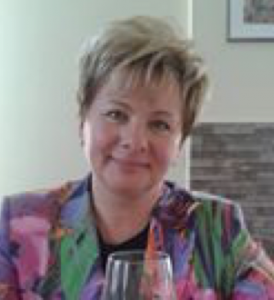 Irēna Ļeoņenko started working as an interpreter in a hotel right out of university. Her hard work and potential for excellence shone through, and in 2001 she moved into an HR role.
Irēna Ļeoņenko started working as an interpreter in a hotel right out of university. Her hard work and potential for excellence shone through, and in 2001 she moved into an HR role.
Today, she heads the Latvian Association for People Management (LAPM), an NGO with 230 company members LAPM organizes activities to increase the competencies of HR managers and specialists – such as seminars, experience exchanges, and an annual conference (last year’s topic was “Lifelong Learning”). LAPM provides resources and networking for HR professionals, and serves businesses and state and municipal agencies. Its vision, ultimately, is to “be the best developer of ideas and opinion leader in the HR management field in Latvia.”
This is a new direction for the organization. Implementing such an ambitious vision requires strategic, savvy leadership. Ļeoņenko knows she has some work to do. She notes that one of the main challenges is changing the culture of HR. Historically, in Soviet times in Latvia, HR’s function was solely administrative, secretarial, and bureaucratic. She notes that a lot of companies in Latvia still operate with this paradigm today – excluding developed international firms.
Since LAPM is working on its strategy for the next three years, Ļeoņenko said the SMP came at a “good time for me to refresh and get new knowledge.” With the SMP’s tools, Ļeoņenko will help LAPM get to where it wants to be: promoting the value of the HR profession within a market context.
The SMP, she said, exposed new areas for her to consider in pursuit of this vision – in particular, marketing, finance, and how everything comes back to strategy.
The SMP’s subject areas “are core elements for any type of activities, whether business or non-governmental organizations,” Ļeoņenko said. “For leaders in organizations, it is extremely important [to] not only work on a good feeling basis, but be real professionals – to have knowledge on how to model, on how to evaluate, on how to take decisions. [The SMP’s] systemic approach helps you to understand the pluses and minuses, the strengths and shortcomings to make analysis in the right way and come to conclusions that help you to go ahead.”
Dovilė Pranckevičienė (Lithuania): From Lawyer to Entrepreneur
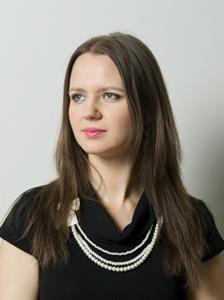 Dovilė Pranckevičienė is the co-founder and director of “LANGUAGE CLUB,” a school in Lithuania that provides General English language training as well as professional and other foreign language training mostly to employees of international or local companies in groups or individually. The school was established in 2013. Already, the young business has done well.
Dovilė Pranckevičienė is the co-founder and director of “LANGUAGE CLUB,” a school in Lithuania that provides General English language training as well as professional and other foreign language training mostly to employees of international or local companies in groups or individually. The school was established in 2013. Already, the young business has done well.
Like her SMP classmate Ļeoņenko, Pranckevičienė did not start out in management. After earning a law degree, Pranckevičienė practiced as an international lawyer. But as is the case for many who become entrepreneurs, she got the itch to do something on her own. Now she heads a staff of 30 people who provide English language services for non-native speakers.
Her company is now well established, and Pranckevičienė said the SMP is immensely applicable to this stage of her business. For instance, the Leadership module made her realize that her company operated without a vision or mission for three years. “I had it in my head, but it was never written or stated anywhere,” she said. This module helped her realize this was important to do.
The Marketing module taught her how to evaluate markets, which helps her shape the direction her language school should take. Finally, after the Strategy module, Pranckevičienė began to see the ways that strategy and marketing work together, and thus the importance of market research and planning as opposed to a trial-and-error method of pursuing growth.
“My knowledge was very narrow,” she said. “That was really an eye-opener for me, (as) one who had no background in business management.”
Pranckevičienė said the SMP boosted her business learning: “I gained a lot of knowledge in a short period of time. It’s nice when you have case studies and discussions and can then try to apply this knowledge. I would definitely recommend [this program].”
“Before taking this program, my main goal was to deepen my knowledge and, furthermore, gain new knowledge in many business areas which might improve my executive skills as well as strengthen my leadership skills and help in the future with managerial work,” she said “This program exceeded my expectations.”
Aleksandrs Lescinskis (Latvia): Active learning for active interests
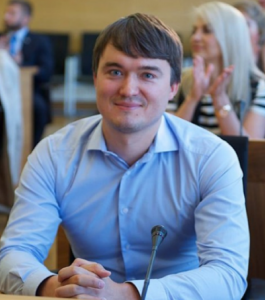 Aleksandrs Lescinskis’ entrepreneurial journey began when he opened his own judo studio at 18. After a sports career, he earned degrees in law and finance and opened his own law firm. He is a self-employed provider of legal services while still managing the studio (Judo Club Dinamo LAT), running educational and summer camps, and directing the Sports Association of Latvia, which he founded to provide legal consulting, seminars, and conferences on sports law throughout Latvia.
Aleksandrs Lescinskis’ entrepreneurial journey began when he opened his own judo studio at 18. After a sports career, he earned degrees in law and finance and opened his own law firm. He is a self-employed provider of legal services while still managing the studio (Judo Club Dinamo LAT), running educational and summer camps, and directing the Sports Association of Latvia, which he founded to provide legal consulting, seminars, and conferences on sports law throughout Latvia.
With all of these pursuits at play, Lescinskis is a nontraditional entrepreneur who wears several hats. Though his legal education provides some understanding on business efficiency, he said, he recognizes his organizations present varied challenges. So he put his sports training to use and practiced active learning by attending the SMP as a Teeter Scholar.
At the SMP, Lescinskis learned the importance of understanding finance and strategic leadership for developing his sports club, which currently trains around 200 kids and recently was named “the best children’s and youth sports organization in 2015 in Riga City” by the Rīga City Council’s Education, Culture and Sports Department. In order to achieve his goals to reach 1,000 members, acquire a modern building, build expertise, and introduce IT systems, Lescinskis knows he must take his management skills to the next level. As for improving his legal businesses, he came away from the SMP with explicit goals and a clear vision to start with marketing, positioning, and looking for new markets. He knows what he needs to do to strategize his organizations’ development; what’s left is to implement it: “[Now] I have a clear plan,” he said.
Besides a greater understanding of strategic management principles, Lescinskis came away from the SMP with broader perspective and a stronger network. He praised the SMP’s concentrated timeframe and collegial atmosphere.
“During a short period of time – two weeks, four modules – you can share your existing experience with professors and colleagues, looking at the same things from different angles, broadening your perspective,” he said. “We are working in different areas, but during this course we can find similar things to discuss, to share. I had to a chance to find out new things, to have new colleagues, new professors, to have communication. All things will help me in the future to go further.”
An entrepreneur like Lescinskis, who has managed organizations without introductory business training, is the kind of manager the SMP is designed to train. He is an ambitious entrepreneur who has followed a nontraditional path to building a business and needs some concentrated training to more effectively implement a vision.
Santa Krastiņa (Latvia): Strategically strengthening the nonprofit sector
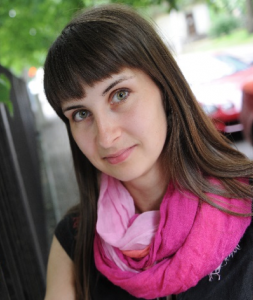 Santa Krastiņa brought an atypical background to November’s Strategic Thinking program. Krastiņa leads homo ecos:, an environmental NGO whose mission is “to create and strengthen a social movement that not only promotes environmentally friendly ideas, but also puts them into practice and lives them out through activities that are beneficial for both the environment and humans.” Homo ecos: promotes wide everyday use of environment- and human-friendly materials and technologies. It provides training and resources to citizens on green lifestyle, climate change, reducing food and packaging waste, and promoting use of environmentally friendly materials.
Santa Krastiņa brought an atypical background to November’s Strategic Thinking program. Krastiņa leads homo ecos:, an environmental NGO whose mission is “to create and strengthen a social movement that not only promotes environmentally friendly ideas, but also puts them into practice and lives them out through activities that are beneficial for both the environment and humans.” Homo ecos: promotes wide everyday use of environment- and human-friendly materials and technologies. It provides training and resources to citizens on green lifestyle, climate change, reducing food and packaging waste, and promoting use of environmentally friendly materials.
“Our aim is to raise awareness about our impact on environment with each decision,” she said. “We have made guidebooks about these topics to help organizers to be more environmentally friendly.”
As executive director, Krastiņa spends a lot of time thinking about homo ecos:’ strategic direction and how to align its activities and resources with its vision. A major challenge is financial sustainability. When revenue is reliable, she said, it is easier to keep the organization aligned with its mission and to retain strong employees in a competitive job market.
“We want to develop [social enterprise] services (such as educational events) but not lose focus on our aim,” Krastiņa said.
Though this tension is not unusual for NGOs, its leaders rarely address it through executive training on Strategic Thinking or management. (As a side note: WDI is pleased to deliver an NGO program that addresses this need.)
By attending the Strategic Thinking program alongside managers of for-profit firms, Krastiņa said she learned from the problems the business sector encounters, as well as how her colleagues develop ideas and solutions. She also has more tools to forge strategic partnerships across sectors – including with traditional, for-profit firms. Finally, Krastiņa noted, the program pushed her to take an internal look at what is driving homo ecos: and how this drive serves employees’ needs and meets ethical guidelines. The strategic framework provided by WDI Faculty Affiliate Doug Bosse, who led the program, was a great asset in pursuit of those goals.
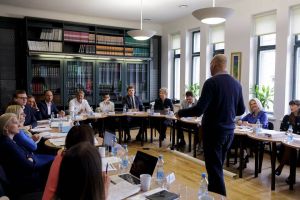
WDI Faculty Affiliate John Branch facilitates the 2016 Strategic Management Program at the Stockholm School of Economics in Riga, Latvia.
Krastiņa has already shared her training with her colleagues at homo ecos:. She expects this to impact how they work with partners, as well as how they approach new markets.“We have a lot to think through about our future – how we will fund ourselves, how we will survive,” she said.
Krastiņa is optimistic that the training will aid her efforts.
“I got new knowledge to put into practice [with] my coworkers,” she said. “Together, we will find a solution.”
________
Thanks to the Teeter Scholarships, SME owner/managers from across the Baltic region can invest in sustainable, long-term strategies for their organizations to scale and grow.
The University of Michigan’s Ross School of Business recently celebrated 25 years of Multidisciplinary Action Projects (MAPs), an action-based learning course for first-year MBA students who receive guidance from faculty advisers. During that span, 10,438 full-time MBA students have worked on 2,010 projects in 92 countries with 1,352 sponsor companies. In recent years, executive, evening and weekend MBA students have participated in MAPs as well.

WDI began sponsoring international MAP projects for Ross in 1992, the year after they began, and have funded and provided faculty advisers for about 225 projects in the 24 years since. WDI President Paul Clyde said MAPs are “one of many tools available to pursue our mission” to develop knowledge and capability that improves the effectiveness of firms and social welfare in emerging economies.
“We’re using it in specific initiatives as a way of building relationships and developing solutions in the field with our partners,” he said. “For us, MAPs aren’t an isolated event, they are part of a longer-term relationship.”
WDI Senior Research Fellow Ted London said MAPs not only benefit students and sponsoring organizations, but also faculty members who advise the projects. It is a valuable way to keep in touch with multiple organizations, understand their latest successes and roadblocks, and think more broadly about solutions.
“I enjoy MAP so much, in part, because it gives me the opportunity to listen and learn,” said London, who also is vice president of WDI’s Scaling Impact Initiative. “These are often organizations we have worked with for many years and it’s great to have another reason for a frank and in-depth engagement.”
Each MAP project requires analytical rigor, critical thinking, and teamwork from the students. Teams of 4-6 students spend seven weeks exclusively working on their MAP projects, including 3-4 weeks in the field. Sponsors receive top-notch deliverables and data-driven recommendations from the team.
After learning about their projects and conducting research in the classroom for several weeks, the students then spend three to four weeks working alongside their project sponsors in the field.
Clyde, who served as an adviser to his first MAP team in 1998 while on the faculty at Ross, said the student projects are a “fun way to teach.”
“Something always comes up that’s an illustration of a point made in their core courses,” he said. “I distinctly remember times when you could see the lightbulb go off and they suddenly understood the concept because they were in that setting, they were living it in the field.”
WDI’s Education Initiative recently began deploying MAP teams to help further its mission of identifying and sharing new ways to enhance management education in emerging markets. This past winter, two MAP teams worked on entrepreneurship projects in Kosovo and Morocco, and one team examined e-learning at a major technical university in Georgia.
“MAP teams allow us to offer our education partners in-depth strategic guidance and for us to be able to consolidate learnings across projects and thereby identify needs, trends, and best practices in management education,” said Amy Gillett, vice president of the Education Initiative. “The projects we’ve sourced related to entrepreneurship education are helping us develop new models and tools to share with a global audience through WDI’s new Entrepreneurship Development Center for emerging markets.”
London, who has been a faculty adviser to about 50 student teams since joining WDI in 2004, called MAPs a “virtuous cycle” that benefits students, WDI’s partners, and the institute’s research.
MAPs embed students with an organization, whether it’s a nonprofit or a corporation, and apply what they have learned in school to help solve an issue the organization is facing.
“They’re solving real problems and understanding the context,” London said “They’re on the ground 3-5 weeks so they have a chance to get acclimated and then really get engaged.”
Clyde said MAPs also are an opportunity for students “to learn how to work in a team setting, to test out their leadership skills, and learn about other cultures.”
Benefitting Organizations, Influencing Students
Allie Schachter was a member of a MAP team that worked with a company interested in rolling out an active learning platform in an emerging market context. Managed by WDI’s Education Initiative, Schachter and her team embedded with the Stockholm School of Economics in Riga, Latvia. Schachter said she enjoyed applying what she had learned in the classroom to a real-world business problem. (Watch a video of Schachter talking about the MAP project below).
“My MAP experience solidified and contextualized many of the concepts discussed in class, which was an incomparable educational experience,” she said. “It was a great opportunity to work with a group on a very large and involved project. Throughout the course of our project, we honed our ability to work together, delegated tasks to one another, and navigated difficult conversations and challenges together.
“It was a really great opportunity to gain experience working for and with others. I will certainly carry those experiences forward when working with teams at work and in future classes.”
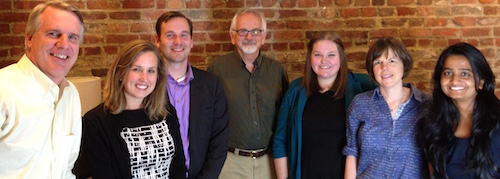
Perry Samson, center, poses with WDI President Paul Clyde, left, WDI Vice President of the Education Initiative Amy Gillett, second from right, and MAP team members.
Perry Samson, the Arthur Thurnau Professor in the Department of Atmospheric, Oceanic, and Space Sciences at the University of Michigan, developed the learning platform and enjoyed working with the MAP students to see how his product performed in an international setting. He called it “invigorating” and a “wonderful interaction” with the students, who were “thinking more deeply about all these things.”
“They thought of a number of things I didn’t think of,” he said. “They provided good insight on what drives adoption of technology in education and identified a number of suggested process changes.”

Diana Pauna
Diana Pauna, former pro-rector of the Stockholm School of Economics in Riga, found the project very useful for her university. She and her colleagues and students valued the opportunity to interact with a highly engaged team of MBA students from the University of Michigan.
“The project was extremely successful and a good learning experience for us,” she said.
London said because the MAPs are sourced with WDI partners, he and others are able to structure a good project that challenges students and benefits the organization.
“MAPs are of real value to the partners,” he said. “They do come back year after year. It’s a pressing issue they’re very keen to solve. Generally they have great outputs and create a substantial amount for the partners. That’s the reason we have a lot of repeats over the years.”
London and Clyde said MAPs can impact organizations for years to come, and can be life changing for students. London said MAP projects give students “an opportunity to see how the majority of the world lives and transacts, and it is something I believe they will carry with them the rest of their lives.”
He said one of the pleasures he gets from traveling with the students is watching them grow from the experience. Some students are committed to working internationally after graduation and have already traveled overseas. But others who will likely live and work in the U.S. when their MBA studies are complete still want to work internationally at least once.
“This isn’t what they are going to do with their life but it is something they want to experience,” London said. “We take them places and expose them to things they might not necessarily ever be exposed to. When we’re in Uganda, we’re not necessarily staying in the capital city. When we’re in Benin, we’re out in the bush.
“You can see the trepidation in some of them before they leave, and a sense of confidence when they get back,” he said. “And a whole new awareness of this world.”
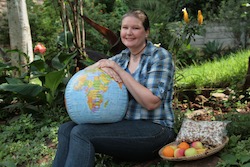
Former WDI MAP team member and WDI summer intern Patricia Griffin.
One student whose MAP experience changed her career path was Patricia Griffin, who was certain she would work for a U.S. automaker in a domestic car plant after getting her MBA. But she decided to join a WDI-sponsored MAP team headed by Clyde and that would work with a Uganda hospital.
Clyde remembers the team functioned without electricity for the first two weeks of its four-week stay. He said it was tough on the team but Griffin was energized by her experience and instead of heading to the auto plant now lives and works full time in Kenya.
“Questioning my assumptions and taking nothing for granted has become a basic mode of operation for how I conduct my career and life,” Griffin said of her time in Uganda. “That’s a direct result of the MAP experience.”
Business leadership today requires strategic thinking – finding and developing opportunities to create value for combinations of customers, associates, suppliers, and communities. In response to this trend, WDI’s Education Initiative will debut a new program on Strategic Thinking in November at the Stockholm School of Economics in Riga, Latvia (SSE-Riga). Register here.
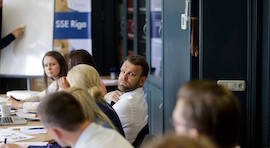
The program joins three other annual executive programs offered in partnership by SSE-Riga and WDI – Supply Chain Management, Advanced Negotiations, and the flagship Strategic Management Program. Amy Gillett, vice president of WDI’s Education Initiative, said strategy has been one of the most popular topics within the 10-day, “mini MBA” Strategic Management Program.
“This program will offer participants the opportunity to learn new strategic tools and thinking, and explore how this can be applied to drive growth at their businesses,” she said.
The two-day course on Nov. 3-4 will be taught by Doug Bosse, a WDI faculty affiliate who teaches strategic management at the Robins School of Business at the University of Richmond (Va.). Bosse said participants will discuss and practice strategic thinking using concepts, models, and tips “that will enhance their strategic thinking as they strive to create and deliver value to their organizational stakeholders.
“This session is designed from the perspective that while frameworks help us understand why certain behaviors work better than others, strategic thinking is most powerful when it goes beyond to leverage your own insights about a diverse set of considerations,” he said. “This session teaches you how to identify which considerations are most important to the situation and to compare your conclusions with other strategic thinkers.”
Participants will discuss strategic thinking after reading case studies on The Walt Disney Company and motorcycle manufacturer Ducati. Then they will apply the same strategic thinking skills to one key initiative in their own organization, and use internal and external analyses to build a case that justifies the initiative. Finally, participants will think through how their organization should address their strategic initiative and consider plans to ensure its approval.
Eligible participants can attend the program free of charge as a WDI Teeter Scholar, named in memory of the late Robert M. Teeter, an advisor to U.S. presidents from 1968-1992 and a WDI board member. Through the scholarship program, WDI awards 20 full-tuition scholarships annually to managers from small- and medium-sized enterprises and NGOs in emerging markets to attend WDI professional education programs.
WDI’s Education Initiative is celebrating the 10th anniversary of its popular, intensive two-week Strategic Management Program – also known as a “mini-MBA” – at the Stockholm School of Economics in Riga, Latvia (SSE Riga).
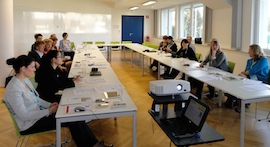
The program, tailored for high potential, mid- to senior-level managers, begins today (May 9). But before the 21 participants arrive in Riga, they will have taken part in two e-learning modules on competition and finance, custom-designed for this program by WDI.
“The e-learning modules give an excellent overview on finance and competition, and get the participants thinking about strategic issues at their organizations before they arrive,” said Amy Gillett, Vice President of WDI’s Education Initiative. “The online modules also allow participants to learn as their schedule permits, and we can provide them more content without more time away from work.”
The Strategic Management Program (SMP) features four modules – strategy, finance, marketing, and leadership – and is structured around an integrative strategic framework. The sessions present both foundational general management principles and the recent business management theory.
Additionally, participants from Fortune 500 companies, small businesses, and nonprofits grapple with real situations faced by their peers in their own business environments.
The program combines lectures, discussions, cases, and exercises. Participants also conduct group work, which enhances their critical thinking, decision-making, and teamwork skills.
WDI has organized the program annually since 2007 in cooperation with SSE Riga. Past participants have come from Latvia, Estonia, Vietnam, Russia, and Lithuania. The program is conducted in English.
Three of the participants – from Lithuania, Estonia, and Latvia – are attending the program free of charge as WDI Teeter Scholars, named in memory of Robert M. Teeter, an advisor to U.S. presidents from 1968-1992 and a WDI board member. Through the scholarship program, WDI awards 20 full-tuition scholarships annually to managers from small- and medium-sized enterprises and NGOs in emerging markets to attend WDI Professional Education programs.
“The Strategic Management Program features leading faculty delivering the latest cutting-edge tools to managers, and providing them new ideas and strategies that they can apply at their organizations,” Gillett said.
This year’s SMP faculty include:
WDI’s Education Initiative connected Michigan Ross MBA students with its longtime partner school – the Stockholm School of Economics in Riga, Latvia (SSE Riga) – to assess innovative new Echo360 technology as part of a Ross’ Multidisciplinary Action Project (MAP) program.
See one MBA student’s recap here.